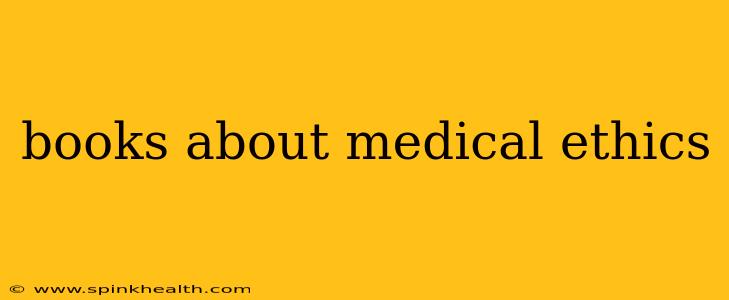The world of medicine isn't just about science and healing; it's deeply intertwined with complex ethical dilemmas. From life-and-death decisions to the allocation of scarce resources, medical professionals constantly grapple with moral quandaries. For those seeking a deeper understanding of this fascinating and crucial field, exploring books on medical ethics is a rewarding endeavor. This isn't just about passing exams; it's about developing a robust moral compass to navigate the complexities of patient care.
Let's embark on a journey through some of the essential texts that illuminate the ethical landscape of medicine. We'll explore key themes and answer some frequently asked questions to guide you in your exploration.
What are some of the most important ethical issues in medicine today?
This is a broad question, and the answer often depends on the specific context and advancements in medical technology. However, some consistently recurring themes dominate the discussion. These include:
- End-of-life care: Decisions surrounding euthanasia, assisted suicide, and the withdrawal or withholding of life-sustaining treatment remain highly contentious and ethically charged. The balance between respecting patient autonomy and preserving life is a constant struggle.
- Resource allocation: The scarcity of organs for transplant, the distribution of limited healthcare funds, and the prioritization of patients during public health crises raise profound ethical challenges about fairness, justice, and equality.
- Informed consent: Ensuring patients are fully informed and understand the risks and benefits of medical interventions before agreeing to treatment is paramount. This requires clear communication, cultural sensitivity, and the avoidance of coercion.
- Medical research ethics: The conduct of clinical trials and medical research requires rigorous ethical oversight to protect vulnerable participants and ensure the integrity of the scientific process. This includes issues like informed consent, data privacy, and the equitable distribution of benefits and burdens.
- Genetic testing and gene editing: Advancements in genetic technologies raise novel ethical concerns about privacy, discrimination, and the potential for unintended consequences.
What are some good books on medical ethics for beginners?
For those new to the subject, several excellent introductory texts provide a clear and accessible overview:
-
"Medical Ethics: A Very Short Introduction" by Julian Savulescu: This concise and engaging book offers a comprehensive introduction to the key concepts and debates in medical ethics, making it perfect for beginners. It covers a broad range of topics, from informed consent to end-of-life care, in a clear and accessible manner.
-
"Ethics in Medicine: A Textbook for Medical Students" by Brian G. Hurwitz, et al.: This textbook offers a more in-depth examination of medical ethics, suitable for students and healthcare professionals. It tackles the complex ethical dilemmas facing medical practitioners today, utilizing case studies and real-world examples.
These books are great starting points, offering a solid foundation for further exploration.
What are some more advanced books on medical ethics?
Once you've grasped the fundamentals, you might want to delve into more specialized or advanced texts. These books often focus on specific areas or present more nuanced perspectives:
-
"The Principles of Biomedical Ethics" by Tom L. Beauchamp and James F. Childress: This classic text is a cornerstone of bioethics, providing a detailed analysis of the four principles – autonomy, beneficence, non-maleficence, and justice – that underpin much of contemporary ethical decision-making in healthcare.
-
"Justice and the Human Good" by John Rawls: Although not strictly a medical ethics text, Rawls's seminal work on political philosophy explores the concept of justice, which has profound implications for healthcare ethics and the fair allocation of resources.
How can I find more books on medical ethics?
Beyond the specific titles mentioned, exploring different sub-specialties within medical ethics can broaden your knowledge. Look for books focusing on topics like:
- Neuroethics: The ethical implications of neuroscience and neurotechnology.
- Reproductive ethics: Issues surrounding assisted reproductive technologies, abortion, and prenatal diagnosis.
- Public health ethics: The ethical challenges of public health interventions and disease prevention.
By exploring various resources and engaging with diverse perspectives, you can build a comprehensive understanding of medical ethics and its ongoing evolution. The journey into this field is not just an academic pursuit; it's a crucial step in fostering a more just, compassionate, and ethically responsible healthcare system.

